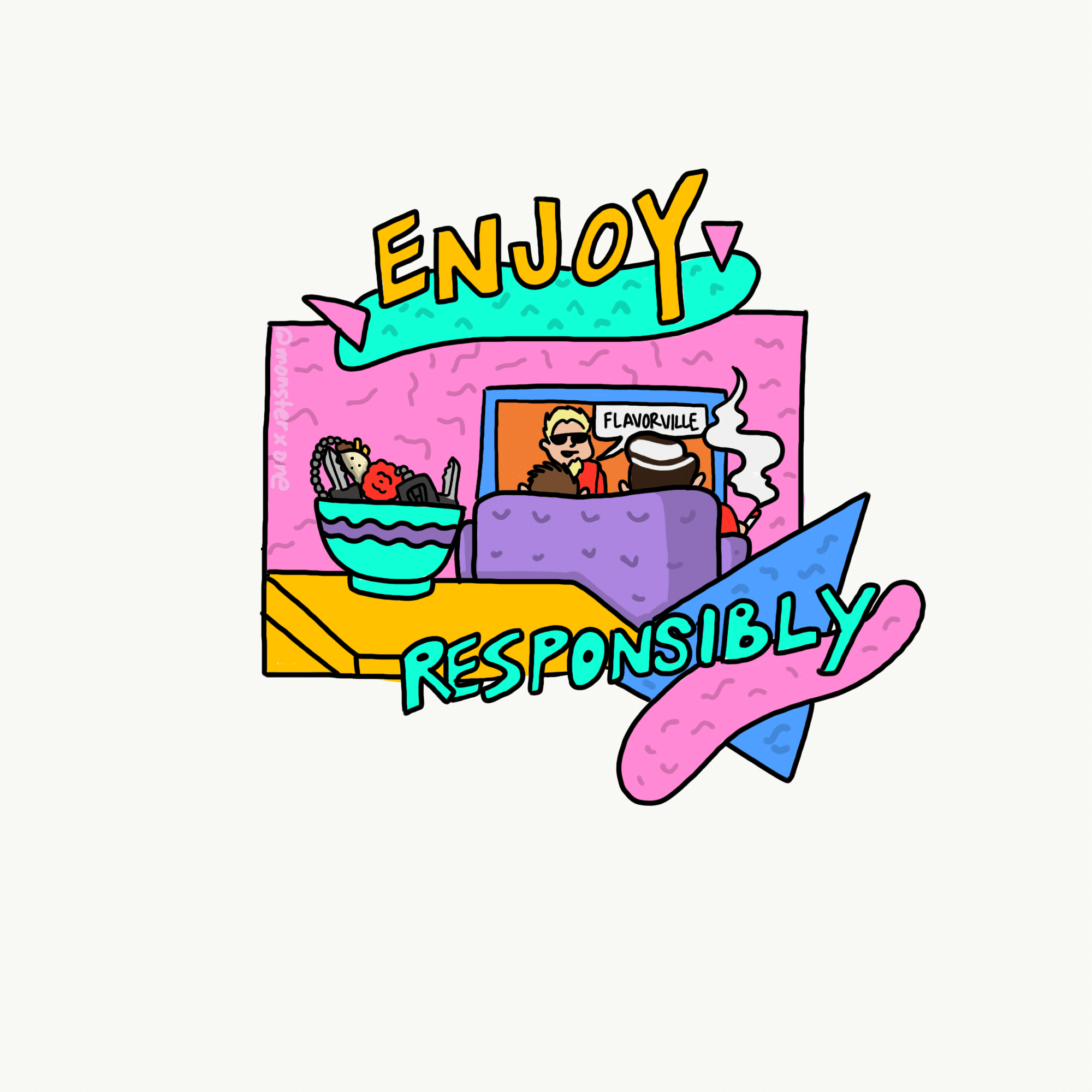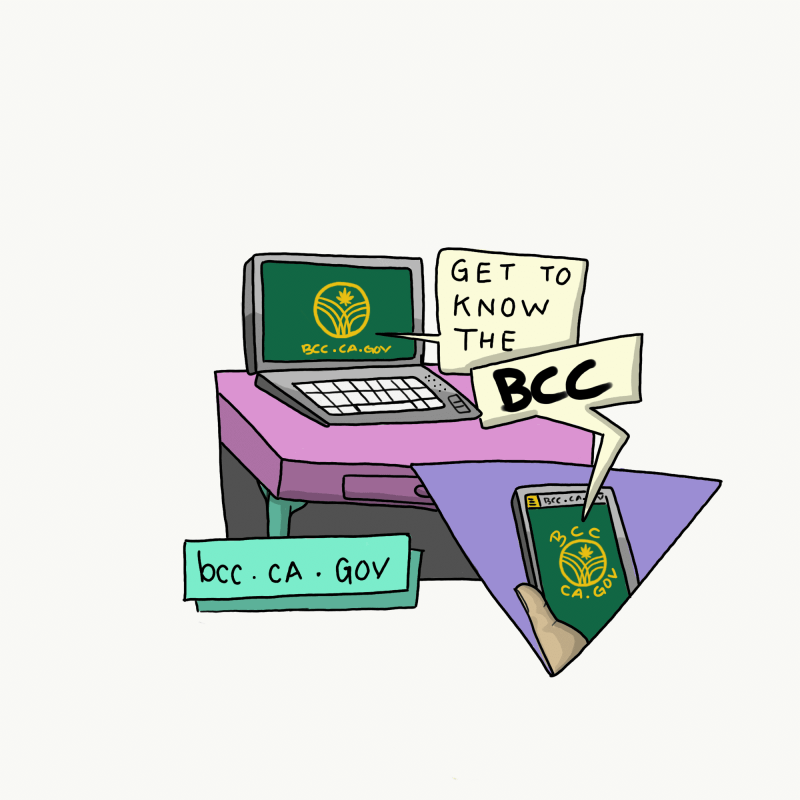[dropcap size=big]A[/dropcap]s of November 20, 2019, there have been over 2,200 vaping-associated pulmonary injury (EVALI) cases and over 45 deaths nationwide including one death in L.A. County. The outbreak has lead to flavored tobacco bans across the country and cast a negative spotlight on vapes containing THC.
According to the Centers for Disease Control, “The vast majority of patients with EVALI, including those who died from their lung injury, had a history of using vape products that contained THC.”
Up until recently though, health officials were reluctant to make a direct correlation between EVALI and THC vapes, despite some reports blaming the illness on black market THC products or “dank vapes” as they’re called.
But on November 8, the CDC came across a breakthrough that points to vitamin E acetate, a popular diluent found in illegal THC vapes, as being the culprit.
“This is the first time that we have detected a potential chemical of concern in biologic samples from patients with these lung injuries,” reads a report from the CDC. The CDC tested fluid samples collected from the lungs of 29 patients with EVALI and found vitamin E acetate in all of the samples, echoing evidence from the FDA and local jurisdictions that point to vitamin E acetate as being the primary substance associated with EVALI.
Vape cartridges that comply with California’s testing standards are scanned for over 60 different pesticides and harmful chemicals. But they’re not mandated to be tested for vitamin E acetate.
Health officials are still investigating the matter though. A report from the FDA stresses that identifying any compounds found in samples is just “one piece of the puzzle” and will not necessarily answer questions about causality.
Vitamin E acetate, more commonly found in cosmetic products, is considered harmful when inhaled. Vape cartridges that comply with California’s testing standards are scanned for over 60 different pesticides and harmful chemicals. But they’re not mandated to be tested for vitamin E acetate. As a legal vendor, however, it’s understood that harmful chemicals should not make their way into products.
In some cases, the only way to verify that you’re getting a safe product is by shopping at a legal vendor.
In October, Leafly.com broke the story that, Kushy Punch, a popular L.A. based brand that you’ve probably seen in dispensaries was served a search warrant by the L.A. County Consumer Affairs Department based on a confidential tip from somebody that had knowledge of the business and its inner-workings.
Investigators discovered an illegal manufacturing operation run by Kushy Punch, a legal state-licensed company. Alex Traverso, a rep from the Department of Consumer affairs tells L.A. Taco via email that they seized over 20 million dollars in illegal products, including 7,000 illegal vape cartridges.
Kushy Punch was allegedly running two businesses, one that supplied legal products to licensed dispensaries and another business that sold to illegal retailers, according to Traverso, who adds that the matter is currently still under investigation.
Both the legal products and illegal products were branded the same. According to Traverso, the only way that consumers would have been able to tell the difference between the two would be based on where they made their purchase. “We always try to tell the consumer to shop at a legal retail location as a way to set themselves up for the best outcome,” Traverso tells L.A. Taco. You can check www.CApotcheck.com to see if a retail location has a state license. “If they do, you can be assured that product has passed the state’s strict testing standards,” Traverso adds.
CannaSafe embarked on an independent study that tested licensed and unlicensed vape cartridges. Their study found that illicit cartridges contained an alarming amount of cutting agents, primarily vitamin E acetate as well as pesticides. The illicit samples that CannaSafe tested all contained over 30 percent vitamin E acetate.
Ruben Cross, the CEO of Vertical Bliss, the parent company behind Kushy Punch, said in a statement that circulated to its partners and L.A. Taco, “Vertical Bliss has robust testing protocols in place and we test every single product we produce in conformity with all applicable laws and regulations, product safety has always been a priority for the brand.” Cross adds that the company has never had a single gummy product fail testing.
Eric Shevin, a lawyer representing Vertical Bliss tells L.A. Taco,” These cartridges were never intended for distribution. These cartridges were located in a single box labeled for destruction following their discovery among packaging and marketing materials at a separate storage facility.
To help consumers better distinguish what’s safe and what’s not, L.A. Taco has partnered with Van Nuys based CannaSafe Labs, the first accredited cannabis lab in the world and one of the leaders in safe cannabis. CannaSafe currently tests products for vitamin E content at the client's request.
Shortly after the EVALI breakout, CannaSafe embarked on an independent study that tested licensed and unlicensed vape cartridges. Their study found that illicit cartridges contained an alarming amount of cutting agents, primarily vitamin E acetate as well as pesticides. The illicit samples that CannaSafe tested all contained over 30 percent vitamin E acetate.
In partnership with CannaSafe we’ve created a comprehensive guide to safe vaping with graphics designed by the CannaSafe design team.
L.A. Taco’s Guide to Getting Stoned Safely
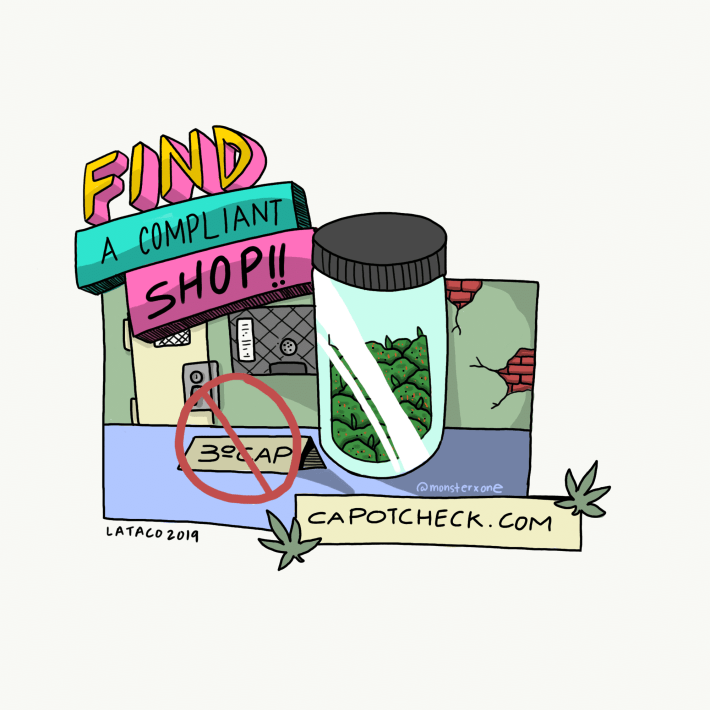
1. Find A Compliant Cannabis Shop
If you’re still shopping at a retailer where the budtender digs their hands into a jar, then you’re shopping at an unlicensed shop. If an eighth of bud costs you $30 or $40 out the door, you’re most likely shopping at an unlicensed shop.
Cannabis products at compliant shops are tested for over 60 different pesticides, chemicals, and harmful fungi. Any product that doesn’t pass won’t make it to the store’s shelves. The taxes and costs might be high but compromising your health to save a few bucks is not the best thing to do if you’re planning on playing the long game with cannabis.
Plus when you shop at a compliant shop you get a consistent potency and dose that you can measure. You never really know what you’re getting when you shop at an unlicensed shop.
Leafly.com is a good place to start when looking for a licensed shop. You can double-check that a business is licensed at www.CApotcheck.com.
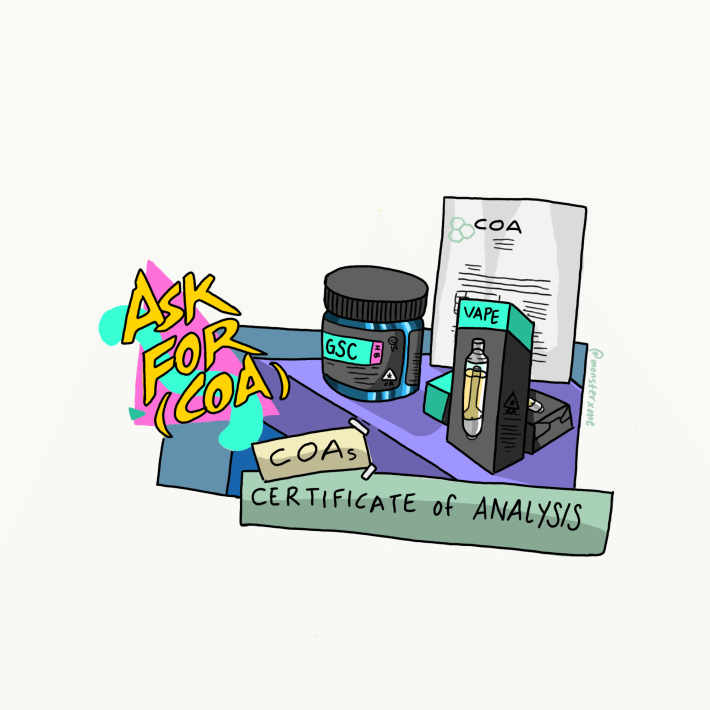
2. Ask for a COA
After cannabis products are tested they’re issued a certificate of analysis. You can ask to see one as a way to verify that the product is safe and that the labeling is accurate. If a retailer refuses to let you see the COA, that may be an indication that the shop is unlicensed.
Cannabis obtained on the legal market goes through more rigorous testing than the food we eat, it’s tested at parts-per-billion, detecting everything from pesticides to mold and other contaminants, to heavy metals. Cannabis products that don’t meet testing standards are usually destroyed.
Untested THC vape pens obtained on the illegal market can contain everything from high concentrations of vitamin E, a common name for “tocopherols” which are found in beauty and skin products but are not safe for inhalation, to straight-up butane, which is used in some extraction methods. Residual amounts of butane are found in THC concentrates when the extraction is not done properly.
3. Familiarize Yourself with the BCC
The Bureau of Cannabis Control is the regulating body behind recreational cannabis in California. Every week they publish a report about new licenses and testing results.
If you don’t have a licensed shop in your city there might be one on the way. Check the BCC’s weekly report to see who’s getting licensed every week,
Also, follow the BCC on Twitter for updates on illegal shops being raided. Last month the Department of Consumer Affairs served a warrant on a Van Nuys based dispensary that netted 5 million dollars in illegal products including vape pens.
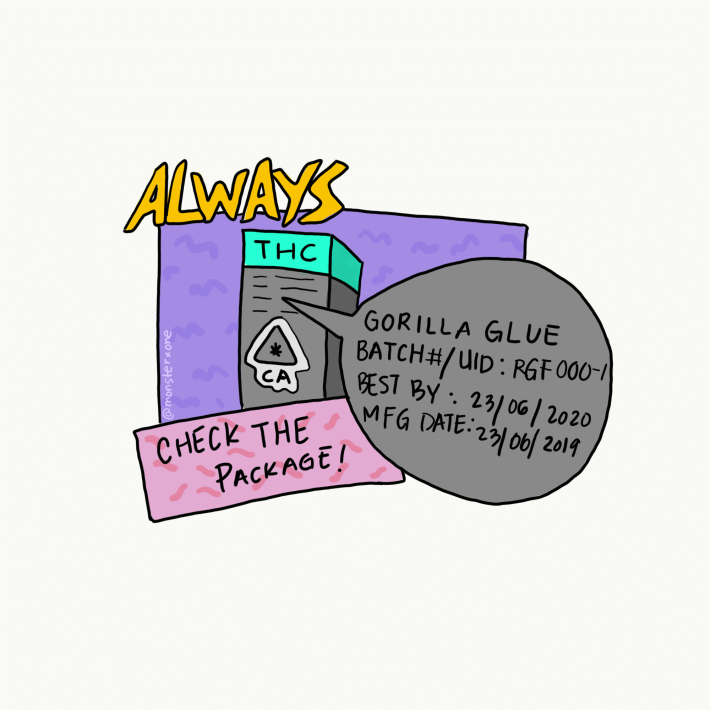
3. Check the Package
The law requires that cannabis products are packaged in a very specific manner. In some cases illegal cannabis is repackaged to pass as a legal product. Checking to make sure the package is sealed and looking out for a batch ID, package date and UID number, is one of the easiest ways to verify you’re getting a safe product.
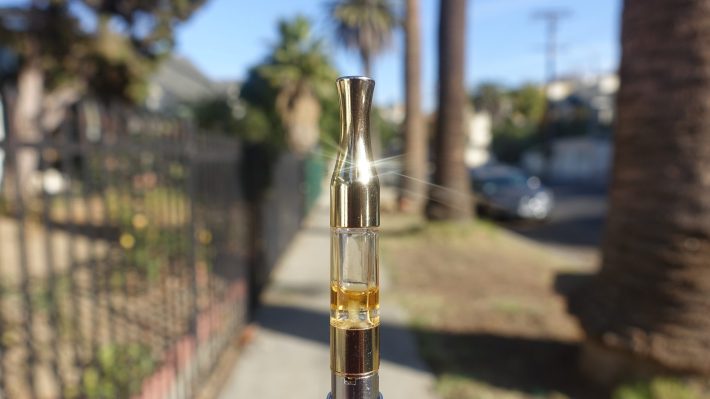
4. High-Temperature Warning
Be mindful of vaping at high temperatures. According to CannaSafe’s report, “The uncertainty around the content of a vape cartridge increases when heated to high temperatures. In CannSafe’s study, samples heated to temperatures greater than 445 degrees Fahrenheit, produced measurable amounts of dangerous chemicals like formaldehyde.
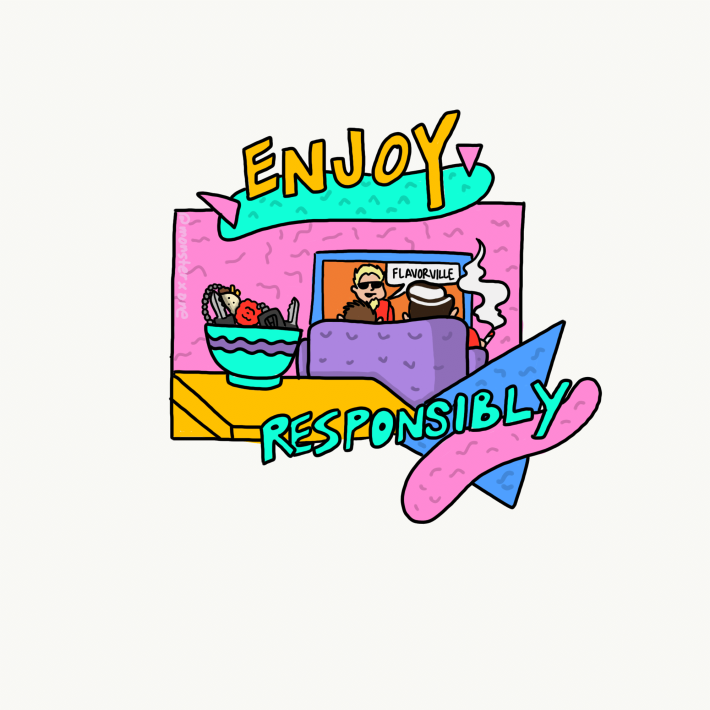
5. Enjoy Responsibly
Don’t overdo it. And if you’re worried about side effects from vaping, don’t do it at all. The CDC says the safest way to avoid EVALI is to not use vaping products of any kind. Just because something is legal doesn’t necessarily mean it’s good for you.
Also, be careful of hitting someone else’s vape. Not only does it spread germs but you can’t always count on your friends to buy safe cannabis products.
